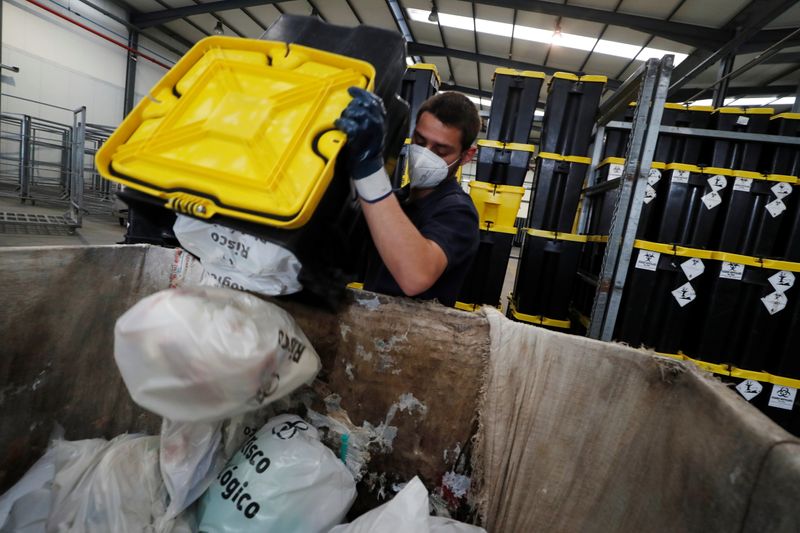By Catarina Demony
CHAMUSCA, Portugal (Reuters) - Every day, as more people get their COVID-19 shots, millions of syringes, needles and tiny vials are thrown away globally.
Vaccinating the entire population of the United States for example, would require so many needles they would stretch around the earth 1.8 times, according to California-based OnSite Waste Technologies.
Experts warn medical waste firms risk becoming overwhelmed by the sheer volume of debris and many environmentalists are demanding more sustainable solutions as the vaccine rollout accelerates.
In central Portugal, in a large warehouse with a burning hot incinerator, workers sort through bins marked 'hazardous waste' arriving by the truckload from vaccination centres.
"The number of people getting shots will increase substantially... This means we have to step up our response," said Adelino Mendes, manager of Ambimpombal waste firm.
The facility houses one of only two medical waste incinerators in Portugal.
So far, Portugal has managed to handle the trash from its vaccine programme but capacity constraints are a structural problem everywhere, according to Carlos Filho, head of the Rotterdam-based International Solid Waste Association (ISWA).
"An unexpected pandemic showed that the world did not have the necessary infrastructure to cope with an increase in waste," he said.
Over the last year, refuse firms have had to handle soaring amounts of trash - from medical masks to food delivery boxes.
France's Suez, one of the world's largest waste management firms, said the volume of medical trash it processed at its plant in the Netherlands tripled last year from 2019.
Stericycle (NASDAQ:SRCL), which operates in countries like the United States and Britain, said it saw an "unprecedented" increase.
'A TICKING TIME BOMB'
Clinical waste is also being generated in non-medical settings where vaccination centres have been set up: sports stadiums, parking lots and concert halls.
The way that waste is disposed of varies from country to country. In some, it is collected, disinfected and sent to sanitary landfills. Portugal opts for incineration.
There is also much room for innovation. U.S. firm OnSite Waste Technologies has created a desktop-size device that can melt syringes and needles and turn them into a small brick of non-infectious trash.
In low-income countries however, where refuse collection is less regulated, medical waste often ends up in open-air dumps or unregulated burn pits, posing a risk to public health and the environment.
"It is a ticking time bomb that will have a terrible impact on people's health," Filho said, adding there were around 11,500 dumps in Latin America and the Caribbean alone. "We cannot accept that waste from vaccination is sent to unsuitable places."
Trash pickers in countries such as India often look for syringes and needles in open-air dumps and resell them on the black market, studies have shown.
Concerns about the end destination of vaccine waste have also emerged in Europe, where Europol said last November it investigated some companies for poor handling of COVID-19 waste.
Spain's Guardia Civil police said a firm operating in Spain and Portugal kept infectious waste in cardboard boxes, leaving trash to deteriorate and become scattered on public roads.
Some see the pandemic as an opportunity to make waste management better and greener, which would also require vaccine waste to be more easily disposed off.
A study published last month in The Journal of Climate Change and Health said vaccination could be made more "eco-friendly" by using materials for vials and syringes which are easier to recycle.

"There is a need to develop sustainable and recyclable products for a better tomorrow," it said.